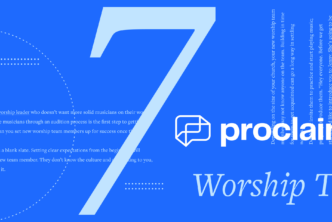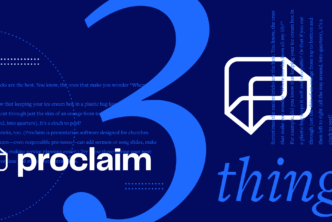When you can’t even get your congregation to say, “Good morning,” it might be hard to imagine those same blank faces giving you personal answers to questions that matter during the service. But thanks to smartphones, that’s exactly what’s happening in some churches.
Imagine starting a sermon series with an important theological question—one that gets your congregation talking about your sermon and discussing their beliefs with their peers.
Or what if before the service starts, while people are still finding their seats, you could find out how familiar people are with their Bibles, the gospel, or your church—without disturbing people who don’t want to participate?
Faithlife Proclaim Church Presentation Software lets you add survey questions to your presentations and display the results live on the screen. All people have to do is tap a button in your digital bulletin. All the questions you add to your service will appear in the bulletin, and as your congregation responds, the screen will display their answers anonymously.
Here are just a few ways churches are using live surveys in Proclaim:
How often do you read the Bible?
(a) Daily
(b) Twice a week
(c) Sometimes
(d) Once a month
If the majority of your congregation isn’t reading their Bibles regularly, that’s probably going to change the way you approach your sermons, your small groups, and, well, everything. It can’t give you a definitive answer about how much people are growing, what they know, or how close they are to Jesus, but knowing how often people read their Bibles can help you understand a little more about where people are coming from. This is the question most churches are asking through Proclaim.
Since the survey is anonymous and responding takes a few taps on your phone, this is an easy way to keep a pulse on how actively your congregation is studying Scripture. It’s probably not a question you need to ask every week, but you might want to check in every few months.
Isaiah said a king would come from [fill in the blank]
(a) Jesse’s family
(b) John’s family
(c) Jacob’s family
(d) Jennifer’s family
This could be a mid or post-sermon question to see how well people were paying attention, or it could be based on what the congregation was encouraged to read during the week. Either way, basic comprehension questions help you gauge how well your congregation retains what they hear and read—plus, they can help people pay attention. What you want people to learn will obviously determine what kinds of questions are worth asking.
Suppose your church is exploring the Minor Prophets together. Before you start your series, you might have a series of questions to see what people know about the Minor Prophets. When the series is over, you could ask the same questions to see if people are learning what you want them to learn. Or, you might give these questions a theological emphasis, like Dr. Mark Ward did in this two part blog post on Judges 11.
Some churches also used these basic comprehension questions to emphasize a point—similar to how you might use a fill-in-the-blank slide, where the right answer is painfully obvious:
What was given to the disciples in the upper room?
(a) Holy Spirit
(b) Cake
(c) A handshake
(d) Fishsticks
Even people who weren’t paying attention can probably feel confident about that one.
Try Proclaim’s live surveys right now
If you have a free Faithlife church group connected to your Proclaim subscription, you can open Proclaim and experiment with surveys right now. To add one to your presentation, just click the “Add Item” drop-down menu and select “Survey Results.”
From there, you can enter your question with up to four possible answers, select a background, and choose one of three graphs to display the results. You can also indicate if you want to show the results on a separate slide later, or display them live.
Don’t have Proclaim? You can try live surveys and more for free with a trial of Proclaim. We’ll even throw in Pro Media—over 10,000 pieces of professional church media designed exclusively for Proclaim.
Download Proclaim to start your free trial.





